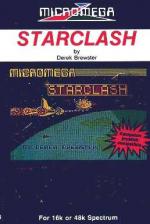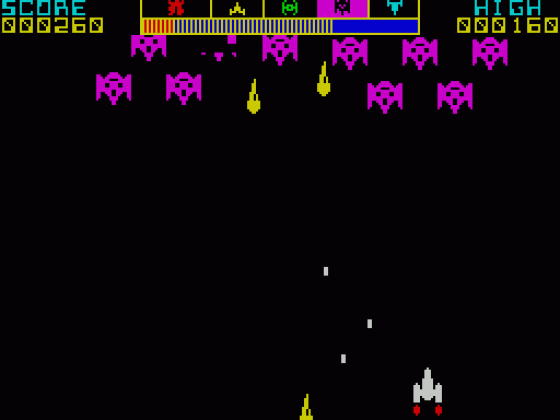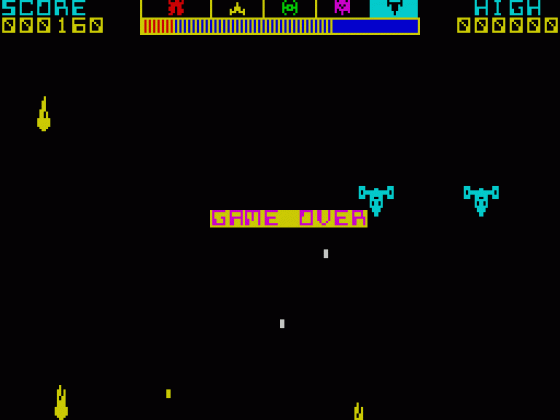
Personal Computer News
 10th March 1984
10th March 1984
Author: Mike Gerrard
Publisher: Micromega
Machine: Spectrum 16K
Published in Personal Computer News #052
A Spectrum was all Mike Gerrard needed to see the solar system - and with no lifeline either.
Spectrums In Space
A Spectrum was all Mike Gerrard needed to see the solar system - and with no lifeline either
There must be more space games for the Spectrum than there are stars in the sky, though you'd need stars in your eyes to get any pleasure out of some of the software on offer. In concentrating on so many variations of a single theme the inevitable result is a lot of dross, so do any of this recent batch of software stand out from the crowd?
Starclash
Not Starclash from Micromega, which is a disappointment coming after their earlier 3D attempts with Haunted Hedges, Luna Crabs and Death Chase. The cover gives the impression that this too is 3D, showing a fighter zooming over the Earth's surface, but this is merely a shot of the title screen, the game itself being an invaders variation that I remember playing in the arcades at least three years ago.

In this, four separate waves of aliens come down the screen at you, different shapes moving in different ways, from a straightforward downward progression to green bow-ties that move up, down and around. You have three lives, and if you let a single ship reach the bottom of the screen then the entire wave starts afresh. After four waves there's a mothership, which has two reactor cores that flash alternately, and you must hit the live one to polish it off and start all over again. It's compatible with a Kempston joystick, but there are hundreds of better games around.
Fireflash
One of them is Fireflash, the best version of a missile command type of game that I've seen. The graphics of the base you're defending are very detailed, full of little buildings and towers, and you move your missiles along underground passages to the chosen launching pads. In addition to the nine skill levels, author Kevin Flynn has written into the program a routine enabling you to alter any of seven POKE values affecting the speed of certain aspects of the game.
The pre-set values and the range of possible alternatives are given on the cassette insert, and the game itself is fast-moving, colourful and reasonably noisy. An ability to understand what you're doing with six fingers simultaneously is an advantage.
Munnery's Mergatroids

From the same company comes Munnery's Mergatroids, which should be marginally easier as here you only need five fingers to enable you, as the instructions succinctly put it, to 'blast every alien you see!' This is an attempt at 3D with the waves of aliens moving towards your sights in the centre of the screen as you attempt to pass through seven zones of them.
The main problem is that the aliens are simple geometric shapes like diamonds and triangles, and because these are transparent it's impossible to pick out what you're firing at and what you're trying to avoid as they come thick and fast towards you, overlapping each other.
The fact that your own missiles are also transparent diamond shapes doesn't help matters, and the game was a case of overkill, I thought.
Cosmos

Cosmos has you as 'the pilot of an advanced defender class starship. You protect convoys of sub-light speed cargo vessels from hostile attack and natural dangers.' The convoy is in the centre of an area of space made up of a 3 x 3 grid. You can only see one of these grids at a time through your viewscreen, but can scroll quickly enough around them.
You're watching out for the asteroid showers which float across as well as 18 alien ships that will try to destroy your convoy. Guiding your lasers by the sight in centre-screen, you must decide whether to stay close to the convoy, when you only see dangers at the last minute, or whether to roam around the grid in search of enemies and risk leaving your convoy open to obliteration.
I found control of this difficult as there's quite a delay between firing your lasers, which come in from the corners of the screen, and the shot exploding when they converge in your sights, by which time the target has zipped away. You have to keep firing continually and try to predict the movements of your enemies, which is not easy.
The game is fast-moving but the graphics are ordinary and again its gets submerged beneath the mass of good material available for the Spectrum.
At one time a machine code game meant automatic interest, but now they're ten a penny, so you have to produce something different.
Space Island
An attempt at that is promised by Space Island, a graphics adventure from Terminal Software, who have previously produced some good material for the Commodore machines. I wasn't impressed by this Spectrum effort, though, which is very similar to another they've published at the same time, Vampire Village. In both you're shown a map on the screen and you must move your character around using the cursor control keys.
In this space story, where you're attempting to find the cause of dangerous time distortions, your character is simply a cross while the map is filled with black dots, representing interesting features. As you arrive at a dot you're shown some text, which may perhaps tell you that there's a rifle or a boat there. Pressing the space bar will get you a list of the 19 commands at your disposal, though unfortunately not for long enough to enable you to note them all down or even read them and consider which to use.
You enter the first letter of your chosen command in inverse video and the game responds (or not), the dot disappears and you go on your way to the next one. As you visit the various dots the game does start to build up like a conventional adventure, with problems to solve, but each time you die there's a lengthy wait while a new game is generated and the only time distortion I noticed was that after playing the game for ten minutes it seemed like two hours must have passed.
If you want a game where you spend half your time with a finger on the cursor key while you watch a cross move slowly over a simple map then this is definitely the one for you.
This only serves to raise the question again of how much of a games software industry the home computer market can support. All the signs are that a good things is being spread much too thinly.
Verdict
Only one outstanding game in this crop, then, so if you're looking round for something to buy make sure you makes your choice before you pays your money.



















